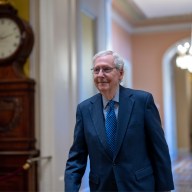By Andreas Rinke and Madeline Chambers
BERLIN (Reuters) – German Chancellor Angela Merkel said she would promote her most prominent critic from within her conservative party, 37-year old Jens Spahn, to a coalition cabinet, in a sign she has heeded calls for renewal to revive her grumbling party.
Although she has agreed a deal with the leaders of the Social Democrats (SPD) for a new “grand coalition”, Merkel needs the blessing of both camps to be sure of a fourth term. Approval from SPD members is far from certain.
She announced her choice of six cabinet ministers from her Christian Democrats (CDU) before the party votes on the deal on Monday. There are as many women as men and Merkel said she was the only one who is over 60 years of age.
She said she had put together a young, dynamic team which represents something of a new start for the party which slumped to its worst result since 1949 in a September election, bleeding support to the far right Alternative for Germany (AfD).
“It was my task to present a tableau of people that is future-oriented and that offers a good mix of experience and new faces,” said Merkel. “This is anything but easy.”
Handing Spahn the post of health minister is an indication that she wants to assuage her critics who have called for fresh blood and a new direction.
Spahn is a champion of the party’s right who has fiercely attacked her open-door asylum policy. A deputy finance minister since 2015, he was previously the CDU’s health expert and he makes little secret of his ambitions to rise to the top.
“Jens Spahn is not the only one to make critical comments. That is okay and nevertheless there is the task of making a good difference in Germany. I believe he wants to contribute to that, just like all other cabinet members,” said Merkel.
While the decision is a sign of how much Merkel’s position has weakened, it may be a shrewd move to stretch an olive branch to her most outspoken critic to keep him on board. Initial reactions were broadly positive.
Carsten Linnemann, head of the Mittlestand Association of the CDU/CSU, no fan of a grand coalition, welcomed the move.
It is “a convincing team of experienced heads and people bringing new energy who represent the breath of the CDU,” he told the Funke media group.
“Now we need a new emphasis in terms of substance and must ensure our conservative element is recognisable and that and we can hold our own in a grand coalition,” he said.
Many in the CDU were angry that Merkel agreed to give the SPD the powerful finance and foreign ministries to do a deal.
WANING AUTHORITY
Merkel also, as expected, will put long-standing ally Peter Altmaier in charge of the economy ministry and keep Ursula von der Leyen, whose star has faded after being tipped as a possible successor to Merkel, as defence minister.
The CDU head in the state of Rhineland Palatinate Julia Kloeckner will take agriculture. Other CDU ministers are new faces. Anja Karliczek, 46, will take over as education minister and Helge Braun, 45, will take over the chancellor’s office.
After 12 years as chancellor and almost 18 years as CDU chief, Merkel’s authority is waning and the party is starting to think about her successor.
In the last few years, Merkel has faced parliamentary revolts from some conservatives over international bailouts for Greece, and much grumbling over her liberal refugee policy.
A further blow came in November when she failed to agree on a coalition deal with two smaller parties, forcing her to turn to the SPD with which she shared power from 2013 to 2017.
A reluctant partner, having seen support fall to its lowest since World War Two in the election, the SPD announces the result of a members’ postal ballot on March 4. The outcome is unclear but there are some signs that they will give their nod.
If members vote “no”, the most likely outcome is a new election or possibly a minority government.
Some analysts say the prospect of a new election will spur SPD members into voting ‘yes’ because their party has slumped further in opinion polls. An Emnid poll on Sunday showed the SPD down two points from a week ago at 17 percent.
In response to growing rumblings in her party about her future, Merkel had promised to “renew” her government.
She took a big step to grooming a successor last week by nominating ally Annegret Kramp-Karrenbauer, premier of the tiny western Saarland state, to take over as CDU general secretary.
The SPD and CSU will announce their cabinet choices later.
(Additional reporting by Thorsten Severin; Editing by Jane Merriman, John Stonestreet and William Maclean)


















